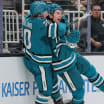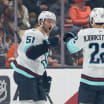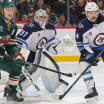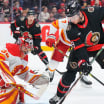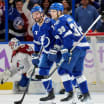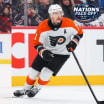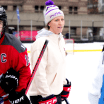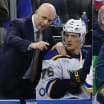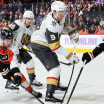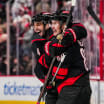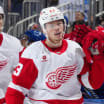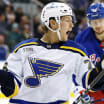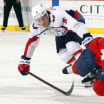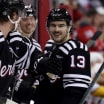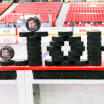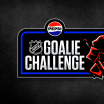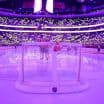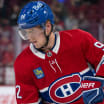Legendary hockey reporter Stan Fischler writes a weekly scrapbook for NHL.com. Fischler, known as "The Hockey Maven," shares his humor and insights each Wednesday.
This week Stan's "Voices From the Past" subject is Hockey Hall of Fame defenseman Brad Park. The Toronto native played his first 7 1/2 NHL seasons with the New York Rangers, the next 7 1/2 with the Boston Bruins and the last two with the Detroit Red Wings. Much of the success that led Park to become a Hall of Famer was rooted in his youth. This included help from his father as well as Brad learning from some setbacks before he became a star with the Rangers. It's an aspect of his career that rarely has been probed. Stan takes the story up to Park being named an NHL First-Team All-Star along with his rival, Bobby Orr, in 1969-70. During 1971, Brad and Stan collaborated on "Play The Man," Park's autobiography up to that point in his career.
Voices from the Past: Brad Park
Defenseman learned from early setbacks, injuries to become Hockey Hall of Famer
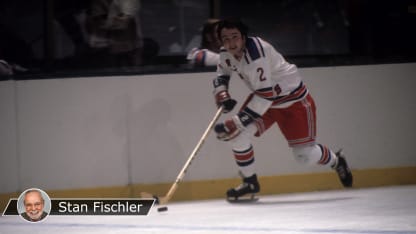
What do you remember about learning hockey?
"It all started for real when I was 6, playing against my brother, Ron, who was two years older. He'd been playing organized hockey and loved it. My father was very enthused about us playing and built a makeshift rink on our front lawn. When Ron wasn't involved with one of his league games, he'd play with me on our own little rink in front of the house. He would skate around a big tree, right in the middle of the 'rink,' and then take a rush at me."
When did you finally get into a real game?
"I got a break when I was a spectator at a game and heard that the regular goaltender didn't show up and his team needed someone to get between the pipes. I seized the opportunity and told them, 'Hey, I'm a goaltender. I'll play goal for you!' Of course, I really wasn't a goalie but I didn't want to blow this opportunity to get into a game. Nobody told me, 'No, you can't,' so I put on the skates and pads and took over the crease. Next thing I knew some guy on the other team came tearing down left wing on me. I figured that the best thing to do to stop him was to hug the right post. My strategy didn't work; he shot the puck into the left corner for a goal. I was very sad and started to cry. As it happened, my mother had been standing behind the net, watching the game, and she shouted loud enough for me to hear: 'Brad, what are you crying about?' So, I wiped the tears from my eyes and shouted back to her: 'That guy wasn't supposed to shoot it in there! He was supposed to shoot it here!' I finally stopped crying and managed to finish the game."
How did you become a defenseman after the regular goalie returned?
"The guys I played goalie with had realized by this time that I was a good skater, so they decided I should stay on the team. Eventually, I was good enough to play in a more competitive league in the Scarborough part of (Toronto). I was only 7 but I was named assistant captain, playing in the Atom Division for boys 9 and under. Next I moved up to the Peewee Division on a team with
Syl Apps Jr.
-- the son of the famous Maple Leaf,
Syl Apps
. My father coached our team and we turned out to be very good."
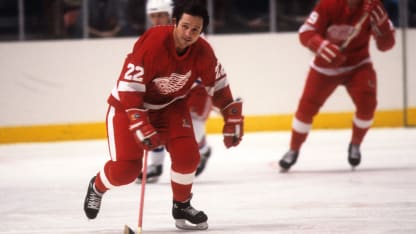
© B Bennett/Getty Images
What was it like to have your father as your coach?
"It wasn't easy. He once dropped my brother because he didn't think he was good enough. Once dad coached us to the final game of the Peewee Hockey Championships in Quebec City. By the middle of the title game we were up 6-0 and running away with it. After the second period, he came into our room and said, 'I don't want you to embarrass these guys. I don't want any more goals unless you have no choice.' We obeyed and won the championship. Another time we won 6-0 and he came into the dressing room and blasted us. 'You guys got a shutout but you made mistakes left and right.' Next time we won 1-0 and he said we played a great game. He emphasized fundamentals. 'Skate, shoot, check' were his favorite words. That and, 'Never give the puck away. Make sure you know where it's going before you pass.'"
When did you start taking hockey seriously?
"My dad was asked to coach the Neil MacNeil High School Junior B team in Toronto. This was important because that club was affiliated with the (Junior A) Toronto Marlboros. The Marlies, in turn, were like a farm team of the Maple Leafs. By the time dad started coaching Neil MacNeil, I had gotten good enough to play for Neil MacNeil, so I wound up getting a hockey scholarship with all expenses paid. On top of that they tossed in $2.50 per game for me. You could say that at age 16 I was a pro; I actually was getting paid to play hockey. It was hard to believe. But the problem was that my father got into some kind of dispute and wound up quitting the coaching job. That hurt."
What kind of problems did you encounter?
"The next season the Neil MacNeil team folded and I was invited to the Hamilton Red Wings camp. But just before I left I got a phone call that the Toronto Marlboros had put me on their priority draft list. However, Jim Gregory, who ran the Marlies, wasn't so sure I could make the team and that made me mad. Dad went to bat for me and talked to Gregory, who said I wasn't good enough to play Junior A hockey. 'Well,' my father said, 'I think he is good enough. And if you don't, why don't you let him go to the Hamilton camp, where they like him?' That stopped Gregory and, finally, Jim agreed to let me go to the Marlies A camp."
How did you keep up with them?
"I singled out two guys -- Jimmy Keon, kid brother of Maple Leafs ace
Dave Keon
, and Jim Davidson, son of Toronto scout Bob Davidson -- and matched them stride for stride. At first I was awkward but I pushed myself, learning to take the longer, smoother strides they were taking until I could stay with them. I was still smarting from Jim Gregory's insult and was determined to make good. On my first shift I lined up (Maple Leafs coach and general manager) Punch Imlach's son, Brent, and whomped him with a body check. A little later I nailed a shifty forward, Terry Caffrey, and sent him flying. From then on I knew I had a shot at one of the two defense openings."
How did you make the A team?
Lucky me -- the Marlboros sent Randy Murray to the Junior A team in London, Ontario, so I stayed with the club as the fifth defenseman. Then, more luck; Marlies played an exhibition against Tulsa, the Maple Leafs' farm team in the Central League. One of our regulars broke his hand in a brawl, which meant I was moved into the regular lineup. We beat Tulsa badly and my game came together so well that I had become the Marlies' No. 4 defenseman. Our opening game was at Maple Leaf Gardens against the Oshawa Generals, led by
Bobby Orr
. On my first shift, Orr got off on one of his end-to-end rushes and I watched him carefully as he cut to center ice. Just when I was going to poke-check the puck away from him, I tripped and fell right on my back. Orr went around me and passed to a teammate, who scored. But I recovered and kept my spot as fourth defenseman for the rest of the season."
Was it clear sailing to the NHL after that?
"Unfortunately not. I suffered a few serious injuries -- torn ligaments and torn cartilage in my right knee, a bruised kidney -- but by my third year with the Marlies, I started thinking about the NHL. As a result of the (1966 NHL Draft), I became Rangers' property and (general manager) Emile Francis approached me about signing a contract. This was in May 1968, when Emile planned to visit Toronto."
What was it like talking contract?
"My dad was with me, but I started the negotiations. I said, 'I want $10,000 to sign and $17,500 to play for the Rangers or $12,500 if they send me down -- on a two-year contract. 'The Cat' refused and we could have hit the wall right then and there -- except that my father intervened. He said, 'Brad, first you have to prove yourself in the NHL before you make any outsized demands.' We went back and forth and we finally settled on $6,500 for me to sign, $10,000 the first year and $11,500 the second. I wound up buying my parents a swimming pool and I got myself a Dodge Charger."
What was it like to skate at Madison Square Garden for the first time?
"Terrific. I had a good camp and beat out
Mike Robitaille
, which meant it was me versus
Allan Hamilton
. We had an exhibition game against the Montreal Canadiens at the Garden and I wound up scoring a goal on a pass from
Rod Gilbert
that made me feel good -- until Francis called me into his office and gave me a ticket to Buffalo, our American Hockey League farm club. Emile explained that he had promised Hamilton a chance and he wanted me to get ice time in the minors. I wasn't happy; I didn't care about his promise to Hamilton; I thought I was a better defenseman than Al. But I figured that the experience in Buffalo wouldn't hurt and I'd be getting the same salary."
When did you get your NHL break?
"Once I got going in Buffalo, I played well; after 17 games, I had two goals and 12 assists and my confidence was high. Meanwhile, Hamilton wasn't working out the way they had hoped, and early in December I got the call. 'Boom Boom' Geoffrion was coaching the team and he put me into the lineup and, at first, it was like heaven. But then we hit a slump and I got benched. 'I don't like this,' I said. 'I'm not learning anything on the bench.' Then he put me back in -- and the next thing I knew, Boomer's ulcers flared up and he was replaced by (Francis). I never saw the bench again. We made the playoffs and I even got a few All-Star votes."
How did you get along with Francis?
"He fooled me during the summer after Montreal beat us in the (1969) playoffs. He heard that I was in New York and phoned me, asked if I'd come to the Garden for a chat. After the good rookie season I had, my hope was that he wanted to talk to me about getting a raise. When I got there, instead of taking me to his office we went down to the dressing room; that baffled me until he said, 'Get on the scale.' I weighed 204 pounds. 'That's not too good, is it?' he said, and I had to agree with him. 'I don't want you coming to camp like that. You'd better be around 196 or else!' Guess what? I showed up at camp in September 1969 and weighed in at 196, on the button. Francis wanted to sign me to another two-year contract for $15,000 I said no to that; I wanted $23,000. 'What happens if you don't have a good year?' The Cat said. I said, 'Don't make me laugh!'"
Did you have a sophomore slump?
"Far from it. Except for getting sick before the All-Star Game and suffering a broken ankle, it was a wonderful second year. I made the NHL Second All-Stars and went to play in the All-Star Game at St. Louis although I had a 102 (degree) fever. I even went to the banquet and played in the game, but I barely survived it. In the game I alternated with
Carl Brewer
,
Jacques Laperriere
and Orr. Turned out that Bobby and I were the youngest pair ever to play in an NHL All-Star Game.. Skating alongside Orr was a godsend. I'd just throw the puck over to him and say, 'Go!' By that time I was too sick to do anything."
How did you break your ankle?
"The year was tremendous until we played Detroit in February. I was chasing toward the corner in the Red Wings zone trying to avoid a Carl Brewer body check by going over him. But my right skate caught on something and I fell over Brewer and he collapsed on my ankle. The pain shot through me like an electric current. The doctor said I was finished for the season with the broken ankle, but I told him I wanted to be ready for the playoffs. When I got back to New York, I went to see the Rangers doctor, Kazuo Yanigasawa, who we loved. (Incredibly, he died later that day). Dr. James Nicholas, who succeeded Dr. Yana, told me that I couldn't play until the bones fused. Still, I recovered in time and was able to help the team make the playoffs although the Bruins beat us in a six-game series."
How would you describe your career to that point?
"My confidence, which is so important to success, was right up there. I made the NHL First All-Star Team that spring along with Bobby Orr and it made me think back to when I was a kid and moving up in hockey. I remembered how a lot of people ignored me because of my size. I remembered how Jim Gregory tried to do the same thing when I wanted to play for the Marlboros. I never forgot how my father stuck up for me and persisted on my behalf. And I thought of all the time and effort I put out to fulfill my life's ambition -- to play in the National Hockey League! I was satisfied that I had made it happen!"
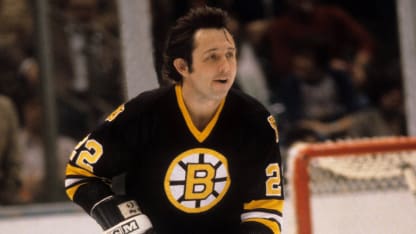
© B Bennett/Getty Images
